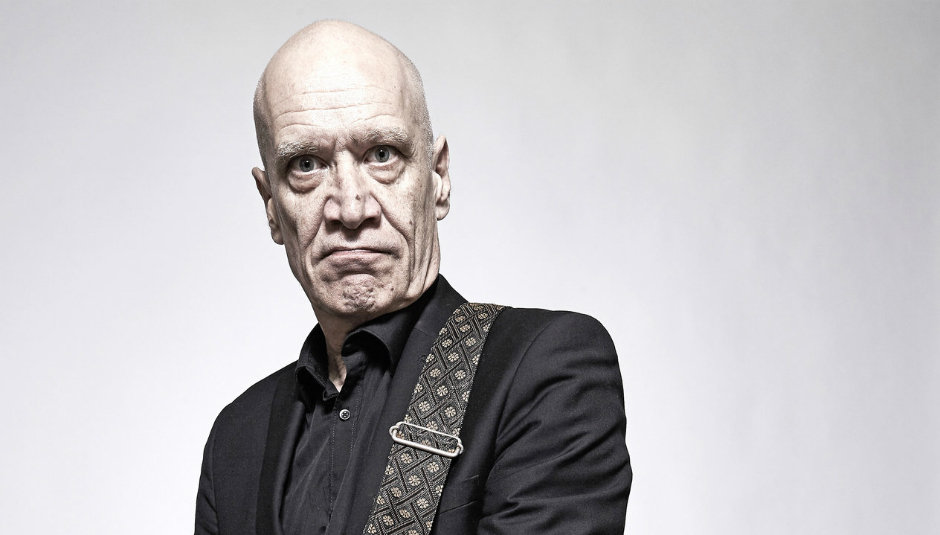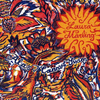“It’s the first thing that hits you when you wake up in the morning and the last thing you think about before you go to bed at night. Oh no, not me! Yes, you. To come out on the other side of that was very strange.”
Wilko Johnson knows that, for the rest of his life, he’ll be known as the man who beat terminal cancer first and a musician second. Anybody facing the kind of diagnosis that he did would snap your hand off for that deal, of course, but Johnson seems especially well-prepared for it; he’d spent his whole life flying under the radar anyway. Still best known for his stint with Dr. Feelgood in the seventies, it was Paul Weller who said of him: “Wilko may not be as famous as some other guitarists, but he's right up there. And there are a lot of people who'll say the same. I can hear Wilko in lots of places. It's some legacy.”
Johnson played in The Blockheads, too, in the eighties, but had been a long time in the musical wilderness by the time the filmmaker Julien Temple chronicled the pub rock legacy of Canvey Island in the 2009 documentary Oil City Confidential. The film inspired a new interest in Johnson’s music, and you might’ve wondered why nobody had captured all that much of him on camera before; he has always been an incredibly striking performer, between his wild-eyed thousand yard stare and his intimidatingly physical playing style, which has him wielding his guitar like a cocked machine gun whilst violently stabbing at the strings with his bare fingers.
Buoyed by the sudden rise in profile, he and his minimalist backing band – Norman Watt-Roy and Dylan Howe, both former Blockheads, on bass and drums respectively – found themselves on a bit of a roll, playing to bigger and bigger audiences and appearing on Later...with Jools Holland. In a bizarre twist, Johnson also landed a role on Game of Thrones, with his maniacal glare a perfect fit for the part of the mute executioner Ilyn Payne, who’s single stage direction was apparently to simply look as menacing as possible. Towards the end of 2011, though, he was struggling to ignore the considerable lump poking out of his abdomen, which was getting so big that his guitar was beginning to rock back and forth on it. The diagnosis - untreatable pancreatic cancer - came soon afterwards.
He was given options – ten months to live without chemotherapy, or potentially a full year with it – but he didn’t see it as much of a choice. He eschewed treatment and immediately adopted the work ethic of a man who’d been told by his doctors that they couldn’t forecast how long it’d be until his symptoms became severe enough to consign him to his sickbed. He booked final tour dates in the UK and in his beloved Japan, and set to work on a collaborative record with Roger Daltrey, Going Back Home, that the pair had been putting off for some time. The gigs sold out in half an hour and were an emotionally-charged success, and the album, which was knocked out in eight days, hit number three in the charts and went gold. The story should’ve ended there.
Improbably, though, Johnson still felt fine. Accordingly, he carried on playing, in fits and starts, until eventually, he was approached by a fascinated oncologist, who strongly recommended a second opinion – after all, by that point, Johnson had far outlived the ten-month prognosis and didn’t look any the worse for it. The consultant he was referred to, at Addenbrooke’s Hospital in Cambridge, thought surgery might be possible – a radical and risky procedure that sought to cut out the three-kilogram tumour, but that would incur considerable collateral damage with it, as chunks of other internal organs would need to go, too. Johnson rolled the dice on it. He won big. Last September, the boy from the Thames Estuary celebrated the seventieth birthday he was never supposed to see with a raucous show at the Royal Albert Hall.
He certainly sounds like he’s on sparkling form when he calls from his home in Southend; even before the miraculous turnaround, Johnson’s cancer fight had won him attention around the globe for the stupefying positivity he was showing in the face of it in interviews. In conversation, he sounds like fellow death-defier Keith Richards, in that practically every sentence tails off into languid peals of laughter, even as he’s detailing the awful nadir of his ordeal, which in physical terms came in the weeks and months after the eleven-hour operation.
“It’s weird, because going from not having cancer to having it, that whole process is just the few seconds it takes for the doctor to tell you,” he explains. “You go into his office, and then you come out, and that’s that – you’ve entered into a different universe. At the other end of it, when I went into Addenbrooke’s for the operation, it wasn’t like they wheeled me into the theatre and went, ‘bang, there you go, we’ve saved your life.’ What actually happens is that you spend a long time in a bed full of tubes, and then you spend ages at home weak as a kitten, wondering if you’re ever going to get your strength back.”
For a long time, a comfortable existence felt like a distant possibility, let alone a return to the studio and the stage. “I could hardly walk. I was wasting away, really. That surgery would really knock it out of anybody, and especially somebody in their late sixties. I didn’t even think about music, or picking up a guitar; I was just trying to get back up on my feet. The surgeon kept reassuring me that my strength would come back, and it did, but so, so gradually. Music was off the agenda for a good long while.”
Not anymore. Johnson eventually made it back to the road and has been there intermittently ever since; he’s been, by his own reckoning, “all over the shop – back to Japan, and everywhere from France to Finland.” He felt the band were as tight as they’d ever been before the cancer stopped them in their tracks, and in getting back onto the stage, he’s picking up where he left off whilst still trying to forge new roads, with a first-ever trip to South America on the cards. The spirit of the farewell-gigs-that-weren’t, though, lives on; it was, Johnson says, there all along.
“One of the things about rock and roll is that it’s ephemeral; it’s in the moment, and that’s always the way I was when I played. It’s just that that attitude spilled over into the rest of my life after the diagnosis. That was how I dealt with it, just concentrating on living in the moment, being in that mindset of having no future and knowing it’s too late to do anything about the past. That’s absolutely rock and roll – grabbing the moment whilst it’s there, because it’s gonna pass. I’ve carried a little bit of that along with me now, having recovered.”
He’s continued his foray into other forms of media, too, even though Game of Thrones have yet to ask him back, not even as a Death-Cheating Consultant when the show resurrected a central character in season six. He began making another film with Temple after he was diagnosed, only for his reversal in fortunes to begin halfway through production; the end result, the appropriately-titled The Ecstasy Of Wilko Johnson, is a beautiful and aesthetically ambitious account of his journey back to life, in which one pre-recovery motif sees him playing chess with Death on a sea wall, as a nod to Ingmar Bergman’s The Seventh Seal. Clearly, at no point did he shy away from his fascination with the transformative power of the imminent end.
What he did find tricky, though, was writing his autobiography, Don’t You Leave Me Here, which was released in 2016. It wasn’t revisiting his own cancer experience that paralysed him, but that of his late wife, Irene, who died in 2004. “I thought it was just going to be a book about my illness at first,” he recalls. “I mean, I assumed that was why the publishers got in touch, so I wrote about that, and then I put a little bit of biography in there as well, some background to explain who I am to people who wouldn’t know. I showed it to the publishers, and they were going, ‘No, we want some of the rock and roll story in there too!’ So I cracked on with that, and it was going great. I’d never written a book before, and I was thinking, ‘This is fantastic, I’m an author now, I’d better start wearing a cravat!’”
Soon afterward, he hit a wall, and hard. “I got up to when my wife died, and...man! Oh dear. Normally, when you remember the past, there’s just flashes and frames, an incident here and there. You don’t go back through everything in sequence, exactly as it happened, so getting back to the day-by-day of that, oh, man. It got me. I was so upset. It was like it was yesterday. I just couldn’t do it; I was sitting there trying to open the laptop and just cracking up. In the end, I had to kind of pull myself together and force my way through it, but it was very hard, and it meant that writing the book was a mixed experience.”
Johnson’s just cut a new record, and the process of writing with it was similarly awkward - albeit it for very different reasons. “It’s tricky when you get to seventy years old,” he says, laughing uproariously, “because what am I supposed to be singing? “I love you, baby, but you done me wrong?” Come on! That’s kind of a problem. But I never thought that I’d be the sort of person to write songs about different sorts of real-life experiences until I got sick, and then right after that I started coming up with a few ideas, and I had these tracks I’d written. I didn’t really intend to ever use them and, obviously, I didn’t know if I’d ever get back into the studio. One of those songs, that’s a reflection of that time, about sitting around the house at night knowing that death’s coming; we’ve recorded it, and it’ll be on the album. It’s actually quite a cheerful one, too!”
The as-yet-untitled LP – Johnson’s first solo effort proper since 2005 – was recorded in September of last year at Rockfield Studios in Wales, with all of the same musicians who played on Going Home Again minus Daltrey; he predicts a March release, although it appears that that date has slipped since. They worked “really bloody hard” and completed the recording in twelve days; as much as time seemed (wrongly) to have been of the essence when he made the Daltrey album in just over a week, Johnson drily observes that, “All the best things I’ve been involved in have been done that way; it stops you from micromanaging every tiny thing with mouse clicks and spending four days deciding whether or not you need castanets on one five-second section of a single song.”
For all the living in the moment Johnson’s been doing over the past few years, decamping to Rockfield forced him to reckon with his past. “Dr. Feelgood’s fourth album was made there,” he remembers, “and that’s also where Dr. Feelgood broke up. That’s where that argument happened.” Johnson left the band in 1977 after a series of clashes with frontman Lee Brilleaux; the pair never reconciled, with Brilleaux dying of lymphoma in 1994.
“Rockfield’s built on a farm, like a stable yard, and there’s the studio on one side and the accommodation down the other, and it hasn’t changed, man. It hasn’t changed in forty years. Sometimes, I’d go out in the dark of an evening, on my own, and stand there, staring at the doorway of the room I was staying in back then. It was in that doorway that this thing happened, something really traumatic that actually was going to go on to change the course of my life. Oh, man, it was quite intense. I’m a different person now, but I could picture my old self in that doorway. I felt like a ghost.”
That, you suspect, is as much looking back as Johnson is going to allow himself. He continues to tour, with UK dates slated for May and plenty more, no doubt, to follow once the album’s out. The challenge remains finding a way to live his life with the fierce sense of purpose that his tangle with cancer inspired now that the spectre of death is no longer breathing down his neck, and the answer to that, it seems, lies in rock and roll. “I’ve never had a manager or anything, and I’ve always just drifted along,” he chuckles. “The way things have happened to me, I just let the chips fall where they may now. What else am I going to do, get a proper job? When the old frame starts cracking up, I’ll have to go and move to Eastbourne, but until then, as long as I’m fit and healthy, I’ll keep going. And, blimey – I am fit and healthy.”
Wilko Johnson will release a new solo record in 2018. He plays seven UK dates from 3 May. For more information, please visit his official website






















